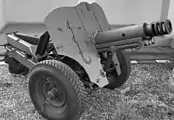76 mm mountain gun M48
The 76 mm mountain gun M-48 (AKA the Tito Gun), was developed after the Second World War to meet the requirements of Yugoslav People's Army mountain units, it can also be used as a field gun.
| 76 mm mountain gun M-48 | |
|---|---|
 A Croatian M48 photographed in 2011 | |
| Type | Mountain gun |
| Place of origin | Yugoslavia |
| Service history | |
| Used by | See Users |
| Production history | |
| Manufacturer | Crvena Zastava |
| Produced | 1948-UNK |
| No. built | unknown |
| Specifications | |
| Mass | 680 kg (1,500 lb) |
| Barrel length | 1.25 m (4 ft 1 in) L/16.4 |
| Width | 1.46 m (4 ft 9 in)[1] |
| Height | 1.22 m (4 ft 0 in)[1] |
| Crew | 7[1] |
| Shell | 76.2 x 385 mm .R Semi-fixed QF[1] |
| Caliber | 76.2 mm (3 in) |
| Breech | Interrupted screw |
| Carriage | Folding split trail |
| Elevation | -15 / +45°, manual handwheel |
| Traverse | 25° |
| Rate of fire | 25 rpm cyclic 10 rpm practical[1] |
| Muzzle velocity | 398 m/s (1,310 ft/s) |
| Maximum firing range | 8.75 km (5.4 mi) |
Description
The first M-48B-1 models may have been Czech M28 mountain guns (bought by Yugoslavia in 1930s) relined from original 75mm calibre to Soviet 76mm (as used on their 76mm regimental and divisional guns), with muzzle-brake added to cope with increased recoil (also Skoda type, borrowed from M.36 AA model).
There have been at least five variants of the M48:
- The M-48 (B-1) has pneumatic tyres and a maximum towing speed of 60 km/h. It can also be towed by animals in tandem or disassembled into eight pack loads.
- The M-48 (B-1A1-I) has the pneumatic tyres and wheels as fitted to the M48 (B-1), plus some of the features of the suspension of the M48 (B-1A2).
- The M-48 (B-1A2) can also be used as a field piece but cannot be towed by animals or disassembled for pack transport.
- The M-48 (B-1A2) has light alloy wheels with solid rubber tyres and modified suspension, its maximum towing speed is 30 km/h.
- The final production model of the 76 mm mountain gun M48 was called the B-2 about which little is known.
The Tun de munte calibru 76 mm model 1982 was a Romanian built version which equipped mountain, paratroop and naval infantry.
Ammunition
Ammunition is of the semi-fixed type with four charges. It is based on that used for the Soviet ZiS-3 (and older) divisional guns (which fired fixed ammunition), but with reduced propelling charge:
- HE M55 projectile weighing 6.2 kg with a muzzle velocity between 222 and 398 m/s;[2]
- High-explosive anti-tank (HEAT) projectile weighing 5.1 kg which will penetrate 100 mm of conventional steel armour at a range of 450 m; and
- Smoke shell WP M60 weighing 6,2 kg.
- HE M70 projectile weighing 6.2 kg with a muzzle velocity up to 398 m/s;[3]
Users
Photo Gallery
 A close-up of an M48 76mm mountain gun belonging to the 28th BIH (Bosnia-Herzegovina) Division, 281st Brigade, 1st Tank Battalion, stationed in Visca, Bosnia.
A close-up of an M48 76mm mountain gun belonging to the 28th BIH (Bosnia-Herzegovina) Division, 281st Brigade, 1st Tank Battalion, stationed in Visca, Bosnia. Romanian M82 76mm mountain howitzer, mady by Arsenal Reșița. Based on the "Tito Gun".
Romanian M82 76mm mountain howitzer, mady by Arsenal Reșița. Based on the "Tito Gun".
Notes
- Foss, Christopher (1977). Jane's pocket book of towed artillery. New York: Collier. p. 39. ISBN 0020806000. OCLC 911907988.
- https://web.archive.org/web/20150320150627/http://marstar.ca/html/reflibrary/YugoOrdnance/76mmheshellm55.html
- https://web.archive.org/web/20150320150747/http://marstar.ca/html/reflibrary/YugoOrdnance/76mmheshellm70.html
- "Myanmar". Archived from the original on 29 November 2014. Retrieved 29 November 2014.
- Krott, Rob (October 2003). "Macedonia's Weaponry: A New Nation Re-Arms and Fights". Small Arms Review. Vol. 7 no. 1.
References
- Chamberlain, Peter & Gander, Terry. Infantry, Mountain and Airborne Guns. New York: Arco, 1975
- Jane's All the Worlds Artillery